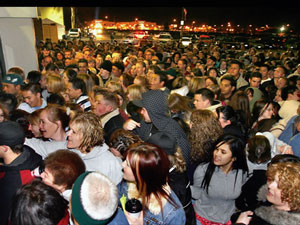X-MAS Comes with heavy price
By Starla Muhammad -Staff Writer- | Last updated: Dec 22, 2010 - 10:10:46 AMWhat's your opinion on this article?
 Shoppers make a frantic rush for the doors before sunrise on Black Friday at Wal Mart. Photo: MGN Online Courtesy: Gerry Mery How high is the price to be paid for this spending and quite possibly going into debt under the guise of observing and celebrating the birth of Jesus, a divine and noble man, who according to biblical and historical scholars alike, was not even born in December? |
While the 2010 overall sales for the “official kick off” to the holiday shopping season increased only 0.3 percent from 2009, retailers still raked in an estimated $10.69 billion, according to Chicago-based research firm ShopperTrak.com. Last year's sales totaled $10.66 billion. Sleigh bells and cash registers rang this year during “Black Friday Weekend” which included Thanksgiving Day through Sunday Nov. 28 that saw totals reach approximately $45 billion in sales.
An estimated 212 million shoppers visited stores or shopped online during the weekend, up from 195 million the previous year. “Some studies have shown that families spend about $1,300 on Christmas gifts, and over half of these generous families are still paying the bills months later,” noted one consumer website.
However, how high is the price to be paid for this spending and quite possibly going into debt under the guise of observing and celebrating the birth of Jesus, a divine and noble man, who according to biblical and historical scholars alike, was not even born in December?
And, while bestowing tokens of appreciation on friends and family is indeed a kind gesture, is the undue mental and emotional anxiety of not being able to afford presents, plus excess spending, adding more stress?
As joyous as this time of year is for many, to others, it can be disappointing, melancholy and even depressing. “For many people, the holidays bring on feelings of sadness and anxiety that can be hard to shake,” notes the University of Maryland Medical Center on its website. According to the National Mental Health Association, reasons for feeling blue around the holidays are numerous and include stress, fatigue, over-commercialization of the holiday, unrealistic expectations, financial constraints and the inability to be with family.
So if “the most wonderful time of the year” leaves people financially strapped and suffering from anxiety while celebrating an event that is historically and religiously inaccurate, then as both the Most Honorable Elijah Muhammad and Minister Louis Farrakhan so poignantly asked, “Whose Christmas” is it?
The so-called birthday of Jesus has been turned into a “commercial feast of foolishness,” said Min. Farrakhan. “Santa Claus has knocked Jesus out of the top spot and the merchants who don't even believe in Jesus are busy selling you foolishness, making themselves rich and you poor on the basis of a lie and that's why they call it X-mas because you don't know who it is that you are worshipping,” said Min. Farrakhan in one of his many historic lectures on this subject matter.
Jingle bells, retailers sell
“The Grinch” may be alive and well nationwide as payday lenders prey upon guilt-ridden parents by suggesting they take out loans for extra cash to pay for Christmas gifts. Online marketing campaigns are in full force, bombarding shoppers with ads touting: “With the Christmas season upon us, do you worry about having enough money to cope with the expenses from buying Christmas gifts for children and friends?” “Where can I find a loan for this Christmas to buy presents for my children?” and “Quick loans for the unemployed.” One site even suggests obtaining a loan to “contribute to your favorite Christmas charity,” while yet another boasts, “Clear your Christmas debt with a payday loan.”
However, as those who fall victim to these ploys are drinking eggnog and hanging stockings near the fireplace by the chimney with care, the payday companies are charging interest rates upward to 400 percent on these loans. “We go into hoc for presents as opposed to living below our means and investing the rest,” says George Fraser chairman and CEO of FraserNet Inc., a global leadership network dedicated to the economic and business training, empowerment and development of Black businesses.
“Keeping up with the Joneses,” and succumbing to the intense media driven machines, like television, have intensified the pressure to make unwise financial decisions during Christmas which is a way for us to assuage whatever pain we might be feeling, he adds. “It is very difficult to escape the messages, overt and covert of consuming and buying and here's what you must have,” Mr. Fraser told The Final Call.
“As retailers look ahead to the first few weeks of December, it will be important for them to keep momentum going with savings and incentives that holiday shoppers simply can't pass up,” said Matthew Shay, president and CEO of the National Retail Federation in a Nov. 28 press release. For many retailers, Christmas sales can account for as much as 40 to 50 percent of their annual sales and revenue and upwards to 80 percent of their overall profits.
Indeed, consumers with shopping lists in hand braved all kinds of weather to arrive at stores the day after Thanksgiving. According to many accounts, retailers opened earlier than in past years or were even open round-the clock as an enticement to those wanting to get a jump on “Black Friday” sales. Macy's, a national upscale retailer opened its doors at 4 a.m. at over 800 of their nationwide locations. The day after Black Friday weekend, known as “Cyber-Monday” was the biggest one-day online shopping day in history with consumers spending over $1.3 billion, up 16 percent from last year, say analysts.
And, while evidence shows many are cutting spending due to the weakened economy, the fact remains that people are still spending in many cases, what they do not have.
 Photo: MGN Online ‘Most people never stop to ask themselves what the major symbols of Christmas—Santa Claus, reindeer, decorated trees, holly, mistletoe and the like—have to do with the birth of the Savior of mankind.’ —Online commentary by Jerold Aust |
Deep psychological wounds that Black people are dealing with because of lack of self-esteem make us look for material ways to satisfy what we feel is lacking during this time of year, observed Mr. Fraser. Noted clinical psychologist and author Dr. Na'im Akbar agrees and said the added stress manifests itself in destructive ways.
Christmas is one of the times of the year where the evidence of addiction to materialism becomes most evident and somehow as a society people are pathologically addicted to material ways of communicating what is felt and what we care about, said the acclaimed lecturer. “It's almost like we have to get a fix, it's almost like having to get a drug and the drug becomes being able to shop, being able to get gifts,” Dr. Akbar said in an interview with The Final Call. The stress to get that fix taken care of, he continued, is at its peak during this particular season.
There are psychological repercussions from the over-consumption and over-indulgence in the commercial aspects of Christmas, notes Dr. Akbar. “It's a compulsive or driven kind of thing, it isn't dealt with rationally so people will go out and spend more money than they have or will be getting anytime soon.”
As a result, people engage in behaviors that are completely irrational and self-destructive like continuing to put themselves in debt, said Dr. Akbar. “If there is something that stands in the way of this self-destructive behavior, we start feeling that we are not as good as other people; we begin to doubt our very integrity, which leads to depression,” he notes.
The added strain of the downward economy can lead some to engage in acts that under “normal” circumstances, one might avoid. On Dec. 16, Oaklandpress.com reported a woman was arrested and is facing criminal charges for robbing a K-Mart to get gifts for her children. “During an interview, the woman admitted that she was having financial problems and stole the items to give to her children as Christmas presents,” reported the article.
People have to understand that money does not equal love, said Dr. Julianne Malveaux, economist and president of Bennett College for Women in a Final Call interview. Spending hundreds or thousands of dollars now and then in February when a bill is due, not being able to pay it is a consequence for not sticking with a budget, she explained.
People have bought into the self-indulgent commercialized aspect of Christmas so in some cases, basic common sense takes a backseat, says Dr. Akbar. “This is a period of frenetic activity, a time when people are trying to juggle work, an increase in social obligations, shopping, decorating, wrapping, entertaining and staying on budget and all this leads to a rise in both physical and emotional stress,” says medicalnewstoday.com.
No Virginia, there is no Santa Claus
In a 2005 online commentary written by Jerold Aust, entitled “Why Some Christians Don't Celebrate Christmas,” he writes: “Most people never stop to ask themselves what the major symbols of Christmas—Santa Claus, reindeer, decorated trees, holly, mistletoe and the like—have to do with the birth of the Savior of mankind.” Mr. Aust, a Christian, goes on to say, “The fact is, and you can verify this in any number of books and encyclopedias that all these trappings came from ancient pagan festivals.”
Religious and secular scholars of various races and ethnicities are echoing the sentiment and facts brought to light decades ago by the Most Honorable Elijah Muhammad regarding the origins and truth of Christmas. Meanwhile, money hungry merchants continue tapping into the psyche of unsuspecting consumers who mean well, but continue perpetuating the Christmas myth of “Jolly Ole' Saint Nick.”
In his book, “Our Saviour Has Arrived,” Mr. Muhammad writes: “Jesus is garbed up and commercialized on by a world of evil and sin and you like this, my people—you love this now. You defy anyone, even God Himself, to try and remove your love of what is false.”
No comments:
Post a Comment